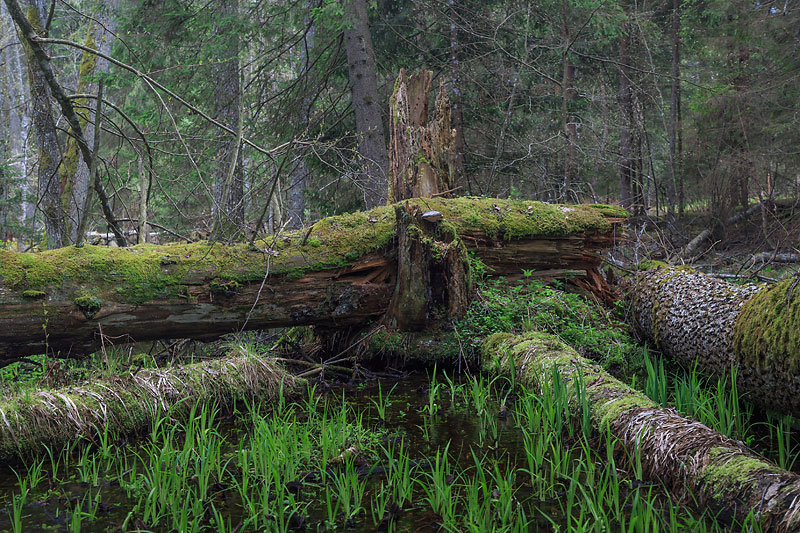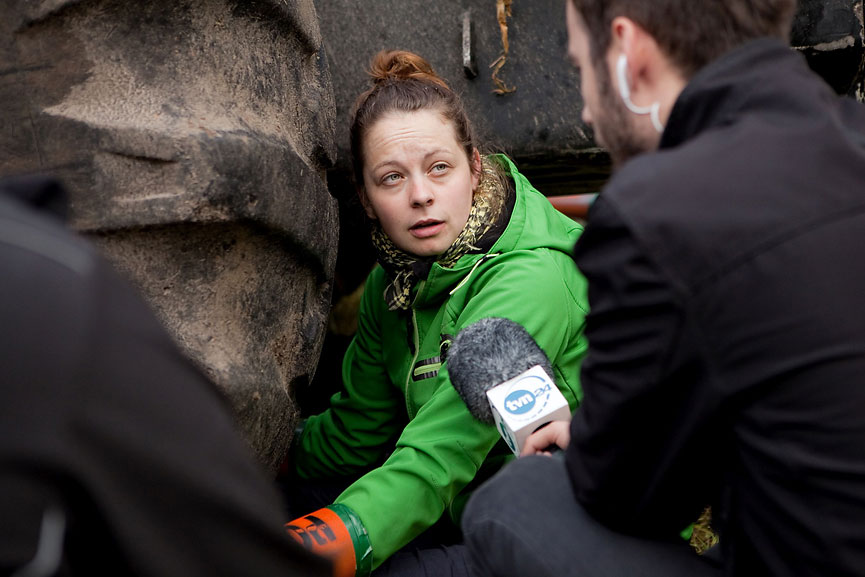Hope for the Białowieża forest
Activists are opposing logging which threatens the home of many rare species primeval forest
20.6.2017
Civic actions in Białowieża continue for the third week. Environmental campaigners are trying to save Europe's largest remaining primeval forest, listed as the UNESCO World Heritage Site. Last Sunday, Polish activists were joined by the first group of Czech campaigners supported by Friends of the Earth Czech Republic (Hnutí DUHA).
European bison is an iconic species of the Białowieża forest [1]. Other protected animals include wolves and Eurasian lynx. But Adam Bohdan of the Wild Poland Foundation is particularly interested in less impressive but all the more important organisms - lichens. They are excellent indicators of the quality of the environment, as are some rare beetles only found in forests largely undisturbed by human activity. Mighty old trees and a high proportion of dead and decaying wood create the necessary conditions for many species dependent on natural processes unparalleled in managed forest plantations. Insects, in turn, provide food for many birds, such as endangered three-toed woodpecker.
 Białowieża forest. Photo: Adam Ławnik www.adamlawnik.pl
Białowieża forest. Photo: Adam Ławnik www.adamlawnik.pl
Along the final stretch of road from Białystok to Białowieża, we were fascinated by a large number of white storks nesting in huge nests provided for them in almost every village. At the end of the warm sunny day, the air cools down and a dense haze suddenly rolls above the ground; without warning a magnificent roe deer jumps out of it. This time, though, we did not come for wildlife watching. What brings us here today is a real threat that the unique Białowieża ecosystem might be destroyed by ill-considered logging.
Only 17% of the precious lowland woodlands lie in the Białowieża National Park. However, the entire forest is a UNESCO-protected area and the Natura 2000 site. In the 100-year-old tree stands outside of the national park, the natural processes continue without human intervention, providing invaluable ecological services.
Concerns about the future of the Białowieża wilderness first arose last year when the Polish government approved a revised plan of "active forest management", allowing the logging of protected forest zones. This move is in breach of the European legislation which Poland has undertaken to comply with. More than 120,000 people signed the petition opposing the plan. International scientists expressed their deep concerns in a letter to Polish Prime Minister Beata Szydlo, warning against the consequences the large-scale logging in the ancient Białowieża woodlands. The European Commission has requested an explanation from the Polish government and considers a claim to the European Court of Justice.
On the other side stands the influential company, Polish state forests, with close links to the ruling Law and Justice party. Indeed, the environment minister is himself a forester ... [2]. Forests untouched by people for hundreds or even thousands of years are being sold as fuel wood, construction material or paper pulp.
Despite the official statistics showing that this year's logging plan has been exceeded already in May, the works continue with the same intensity, according to the Wild Poland Foundation volunteers who monitor the activity in Białowieża. Conservationists, therefore, decided for more radical protests. Non-violent blockades of heavy logging machinery - harvesters - have been taking place since the end of May. People from all over the country arrive to join Greenpeace activists and conservationists from the Wild Poland Foundation. Polish campaigners are also turning for help to the international community. Our was the first group that responded to their calls.
Maybe, the reason was that we remember all too well the blockade of logging in the Šumava National Park (it took five years for the court to confirm that police actions against non-violent citizens' protests were unlawful). Adam Bohdan was among the international scientists who signed a letter asking the Czech government to stop logging in the most precious parts of the Bohemian Forest range. Now is the time to repay Polish colleagues for their help. Almost everyone in our group of nine has some personal experience from the Šumava protests.
We arrived at Białowieża two days after the third civic protest, during which activists blocked for a day one of the harvesters. But the police and forest guards ended the blockade with brutal force [3]. At first, we were taken aback by the gloomy mood in the campaigners' campsite. But watching the footage of last events, we understood. It appeared that people standing for the forest have begun losing their faith. Our arrival seemed to have given them new hope, though. Between preparations for the next event, we took a short walk into the woods. We did not need to go far; just few hundred meters from the village, we saw several forest giants and some huge moss-covered tree trunks decaying in the undergrowth. A reminder of what we came to defend.
At five in the morning, we are all arriving at the location where the machines are stationed - one harvester and one forwarder. According to the plan, groups of four attach themselves, using heavy metal tubes, to the wheels towering above us. Others place banners around them. Soon the first TV crew arrives, Polish TVN24. They will stay with us all day and even overnight. More TV crews and other reporters come and go during the day. Our Czech group gets quite a lot of media attention. We have with us Jaromír Bláha, Hnutí DUHA forestry expert, who explains the importance of the lowland primeval forests and points out the analogy with the situation in the Šumava National Park. He highlights the positive effect of wild nature on the sustainable development of the region and local economy.
 Under the harvester. Photo: Martin Procházka prochyphoto.com
Under the harvester. Photo: Martin Procházka prochyphoto.com
In the end, though, the "show is stolen" by an old local man, a former forester, who came to thank young people for their efforts to save the forest. "My heart is heavy when I see what is happening here," he says. "A good forester should know better; the forest can manage itself. But they are not foresters; they are thieves only interested in wood and money they can get for it."
More local people express their support by bringing food and drinks. But the voices in support of logging can also be heard. Two men repeat what some politicians have been claiming: that the protests are organized and paid for by Russia [4].
Unlike last week, the police today are quite friendly. Two officers take down everyone's details, another patrol inquires about our well-being ... They are getting similar answers: "We'd feel much better, if Polish authorities respected the laws, so we wouldn't need to protect the forest tied to a machine."
Later in the day, the area is surrounded by forest guards. Clearly, they are trying to exert psychological pressure on campaigners. Needless to say, the strategy does not work. Our strength is our conviction that we stand for the right thing. An order to intervene apparently did not come today, so after a few hours, the guards retreat.
As the evening approaches, Czech team decides to stay under the machines all night to continue blocking them the next day. Our determination is contagious; most Polish protesters stay too and with us the TVN24 crew and the police patrol, which promised to watch over us.
After the starry night, the blockade continues, this time without forest guards. Is it possible we got foresters thinking? Next day is a national holiday in Poland and the beginning of a long weekend so we all hope that this week at least, there will be no more logging. Polish campaigners are inviting people for a walk through the woods on Saturday and planning other events in cities all over Poland. The idea is to raise awareness and get the public to speak up for the Białowieża forest.
 Starry sky in Białowieża. Photo: Martin Procházka prochyphoto.com
Starry sky in Białowieża. Photo: Martin Procházka prochyphoto.com
On our way home, all we know for sure is that in two days we have saved about 400 trees. But we hope that we have achieved more. The civic protests like this one should remind Polish officials that people care about the environment and encourage them to start talking with scientists. Environmental groups such as Wild Poland Foundation and Greenpeace demand the logging in the Białowieża forest to stop until independent experts are able to evaluate the state of the ecosystem. Based on the thorough assessment, a new forest management plan should be prepared, with the main objective to protect the unique European wilderness.
Anyone can support the campaign to save the Białowieża forest. For more, look at Puszcza Białowieska.
[1] The European bison were extinct in the wild at the beginning of the 20th century. In Białowieża, the last wild bison was shot dead in 1919. About 50 animals, however, lived in captivity throughout Europe. Only 7 individuals suitable for breeding founded the new population which was gradually released into the Białowieża wilderness in the 1950s and 1960s. More reintroductions followed in other European countries, including the Czech Republic (since 2014, several dozen bison roam the Milovice Nature Reserve). The Białowieża forest currently supports the largest population of the European bison, numbering a bit less than 500 individuals.
[2] The Guardian: Poland starts logging primeval Bialowieza forest despite protests
[3] Footage released by OKO.press, Polish independent media portal https://www.youtube.com/watch?v=aNq2EBzTRmc#t=313.323562
[4] The Guardian describes the division in local community on the issue of logging in the Białowieża forest: Last stand for Europe's remaining ancient forest as loggers prepare to move in Bialowieza
Author: Martina Dušková




